Browse through activities, takeaways and images from each day of the 2022 Black and Indigenous Summer Institute experience.
Framing Rights and Access | 7/11
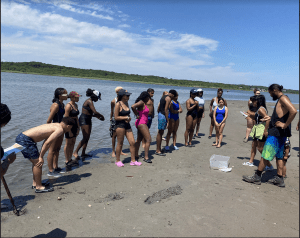
On the first day of programming, executive director of CT Humanities, Jason Mancini, gave a talk on Indigenous maritime history in the morning, which was followed by a trip to Misquamicut Beach to meet with the Spears family and engage in traditional foodways through Quahogging! Students had the opportunity to get out in the water at a salt pond, explore, and dig through the sand to find quahogs. Participants were able to find two large baskets full! Afterward, some students got to enjoy fresh grilled quahogs on the shore and chat about the importance of accessing traditional waterways. They then heard from Mrs. Mathews, a member of the Manissearn community from Block Island, about the challenges of the recognition and the importance of being active members of your community.
Framing Narrative | 7/12
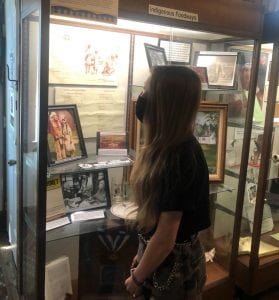
Led by Lorén Spears, Executive Director of Tomaquag Museum, students toured the Tomaquag Museum, enjoyed lunch at Sly Fox Den– a local indigenous restaurant- and discussed indigenous connection to the land after an outdoor tour of the grounds. Afterward, students visited Smith’s Castle where they considered the differences between the colonizer and the colonized and the ways in which historical narratives are presented. The difference in historical framing between the two museums laid the foundation for students to engage with challenging opposing perspectives.
Framing Perspective | 7/13
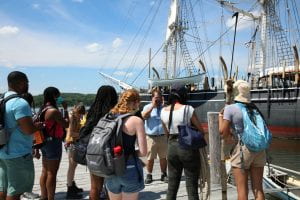 Students watched an excerpt of Amistad, a film based on the events in 1839 aboard the Spanish slave ship La Amistad, where enslaved Mende tribesmen gained control of their captors’ ship off the coast of Cuba, and the international legal battle that followed their capture. After discussing the themes and complexities of the movie, students visited a replica of the Amistad in person. Afterward, students visited the Mystic Seaport Museum for an engaging tour filled with activities such as harpooning and learning the process of maritime rope making.
Students watched an excerpt of Amistad, a film based on the events in 1839 aboard the Spanish slave ship La Amistad, where enslaved Mende tribesmen gained control of their captors’ ship off the coast of Cuba, and the international legal battle that followed their capture. After discussing the themes and complexities of the movie, students visited a replica of the Amistad in person. Afterward, students visited the Mystic Seaport Museum for an engaging tour filled with activities such as harpooning and learning the process of maritime rope making.
Framing American Slavery | 7/14
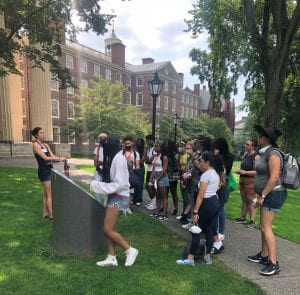 The theme of this day focused on American slavery in New England. Students took part in the CSSJ’s Slavery and Legacy Walking Tour around Brown’s campus and heard from professor Christopher Roberts about port cities and the transatlantic slave trade.
The theme of this day focused on American slavery in New England. Students took part in the CSSJ’s Slavery and Legacy Walking Tour around Brown’s campus and heard from professor Christopher Roberts about port cities and the transatlantic slave trade.
Framing Ourselves | 7/15
Students took a tour of the Roger Williams Memorial on North Main Street and learned about the Providence race riots of the 1830s from Stages of Freedom executive director, Ray Rickman. The day concluded with a walk over the Stages of Freedom bookstore and museum across the Providence River.
Framing Inclusion | 7/16
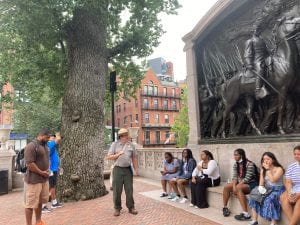 Students took. trip to Boston to learn about the struggles and resistance movements of the African American community there. They visited the African American History Museum and the African American Heritage Trail.
Students took. trip to Boston to learn about the struggles and resistance movements of the African American community there. They visited the African American History Museum and the African American Heritage Trail.
Framing Place and Space 7/17
To wrap up week 1 of the Summer Institute, students made a visit to King Philip’s seat in Potumtuk (Mount Hope), Bristol. The peaceful, wooded walk was led by facilitator Leah Hopkins. This was followed by a BBQ and picnic at Colt State Park overlooking the water.
Creating a Decolonized approach| 7/18
Students began week 2 of Summer Institute by examining how museums center certain stories and overlook others. Program facilitator, Leah Hopkins led a discussion with students before they headed to the John Brown House where they learned more about the context and challenges of museum work.
Creating Awareness and Developing Advocacy | 7/19
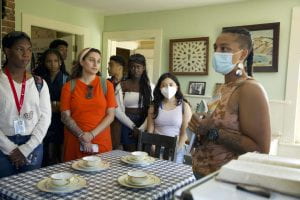 Students had of their most exciting experiences yet- a trip to Martha’s Vineyard! Students boarded the Sea Streak Ferry in the morning and headed to the Aquinnah Reservation at the top of the island to learn more about Indigenous history and the community there. After visiting the Aquinnah Cultural Center, students bonded with their host ( whom they lovingly referred to as Aunty Christina) over lunch and took in the beautiful view of the colorful Aquinnah cliffs. Students then relaxed on the beach after lunch before heading back to the ferry.
Students had of their most exciting experiences yet- a trip to Martha’s Vineyard! Students boarded the Sea Streak Ferry in the morning and headed to the Aquinnah Reservation at the top of the island to learn more about Indigenous history and the community there. After visiting the Aquinnah Cultural Center, students bonded with their host ( whom they lovingly referred to as Aunty Christina) over lunch and took in the beautiful view of the colorful Aquinnah cliffs. Students then relaxed on the beach after lunch before heading back to the ferry.
Creating space for Solidarity, Redress, and Reconciliation | 7/20
Students examined how communities address ongoing systems of oppression. They took part in engaging activities led by Marco McWilliams of RI Black Studies and Christopher Samih-Rotondo of DARE.
Sharing Knowledge | 7/21
On this last day of the program, students visited the Mashantucket Pequot Museum for a guided tour and engaging discussion. After lunch, students visited the Mashantucket Pequot Reservation’s sugar house to learn about the tribe’s ongoing efforts for cultural survival. This was followed by a visit to the Reservation’s Pow Wow grounds where students had the opportunity to join in community service by weeding the Three Sisters garden of corn, squash, and beans- a fitting act of gratitude to conclude the summer institute.